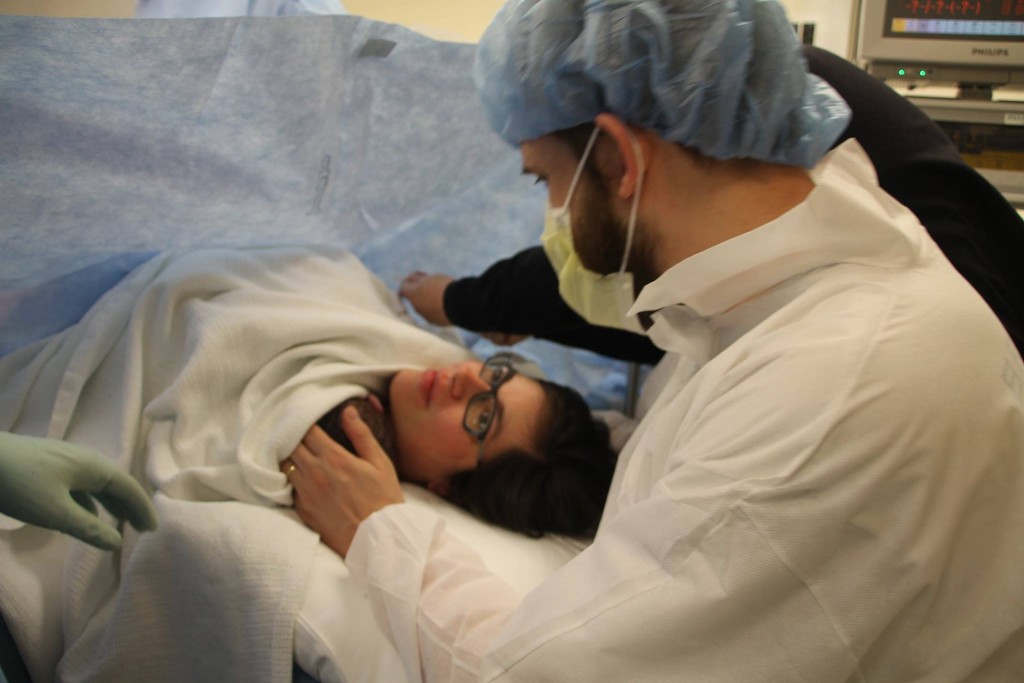
Since relatively few families plan to birth via cesarean, it’s easy for moms and their support people to be taken off guard when what started as a normal birth turns into a surgical experience. Here are some tips for ways friends and family can support a mom during a cesarean recovery.
- Help mom assess her pain levels and get help if needed. When in doubt, talk with her care provider.
- Be prepared to help with basic hygiene tasks like showering and getting to the bathroom as needed. If she doesn’t ask for help, offer it. She might be shy or embarrassed about needing help with basic self care.
- Listen to her. The emotions that come with birth can be contradictory and complicated and particularly so after a cesarean. She might feel relieved, scared, betrayed or any number of different emotions. Give her a safe and supportive place to work through these feelings without fear of judgment.
- Validate and anchor her experience. Working through what happened with someone who was there can be immensely valuable. Sometimes hearing about your emotions and memories can help her develop a coherent narrative of her experience. This is particularly true if she was heavily medicated and doesn’t clearly recall everything that happened or had to be separated from her baby.
- Understand her physical limitations. If she’s discharged on pain medications she won’t be able to drive, and she certainly shouldn’t be lifting older children or anything heavier than her baby until her doctor clears her. Walking, bending over, and getting in and out of bed will all be more difficult/painful at first.
- Once home, try to arrange things so that she can take care of herself and her baby with a minimum of effort. For instance, set up mom’s “nest” with water, snacks, diaper changing supplies, and a good book or the TV remote so that she can rest and care for her baby even when other support isn’t available (this is especially necessary in multilevel houses).
- Expect a fair amount of frustration, and don’t take it personally. First time moms in particular can be overwhelmed by the transition from competent grown up woman to someone who frets over bodily fluids. Add in the pain and restrictions of recovering from a cesarean and it’s easy to feel only slightly less helpless than your newborn. This should pass quickly, but the enforced rest can be hard on moms used to going and doing.
- Arrange for help. Burnout can happen after birth, so call in all the favors. Meals, rides to doctor’s appointments, help with older children, and someone to fold the laundry are all valuable contributions. The role of visitors is to assist and nurture the mother and NOT to sit around holding the baby while the mother tries to do for herself. (Although most moms are happy share some baby snuggles while she showers and eats a meal with two hands.)
- Realize that she may continue to need emotional support and that her perspective on this birth might change over time. While some women start off very satisfied with their cesarean and then start questioning it later, other women who were initially upset come to terms rather quickly.
- Also, for traumatized mothers, be aware of potential triggers such as birthdays and other women’s birth stories. At such times she will benefit from a safe place to retreat away from anyone who might shame or criticize her emotional responses so that she can deal with her emotions before returning to her social and familial obligations.
- Access external help as needed. This can include lactation consultants, support groups, doulas, friends, massage therapists or chiropractors, counselors, and other sources of maternal/infant care and encouragement. It’s better to ask about a small problem instead of waiting for a bigger one, and some moms may need encouragement to seek help.
- Finally, celebrate with her. Your joy in this child and in her mothering will fuel her recovery and her self-perception as a mom for many days to come.
If you’re looking for more resources about cesarean and recovery or want to know more about your birth options after a cesarean, please reach out to your local ICAN chapter. The moms there can offer a wealth of birth and recovery related information and provide a safe place to work through your emotional recovery. If there is no local chapter, you can also check out ICAN’s Facebook page for support and encouragement.
 Photo Credit: Spark Photography
Photo Credit: Spark Photography
Natalie Short is a postpartum doula, ICAN chapter leader, and mother of two. Her first was born via emergency cesarean, and her second was a CBAC after a long induction with a very VBAC enthusiastic doctor. She lives in Birmingham, AL, with her husband and spends most of her time kid wrangling, volunteering, and dabbling in various creative projects.